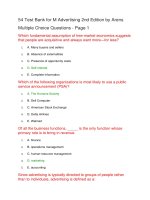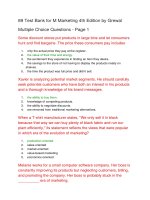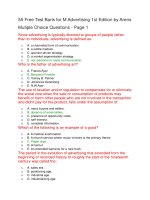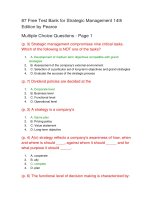Test bank for gerontologic nursing 5th edition by meiner
Bạn đang xem bản rút gọn của tài liệu. Xem và tải ngay bản đầy đủ của tài liệu tại đây (357.13 KB, 24 trang )
Instant download: Test Bank for Gerontologic Nursing 5th Edition by
Meiner
/>
Chapter 06: Family Influences
Meiner: Gerontologic Nursing, 5th Edition
MULTIPLE CHOICE
1. While children voice concern about their father living alone after having
a mild stroke that resulted in only minimal disability, the patient angrily
disagrees, stating that he’s always managed on his own and can do so
now. The nurse can be most helpful to this family by:
a.
assuring them that their father’s physical
limitations should not cause a safety issue.
b.
assisting them in identifying how they can
help their father to live independently.
c.
offering to arrange a social service consult to
arbitrate the conflict.
d.
suggesting that the patient accept the
services of a home care aide on a short-term
trial basis.
ANS: B
Preserving a patient’s autonomy through independent living is vital to a
patient’s sense of well-being and can often be preserved through cooperation
between family members to provide the required support. If the nurse can help
the family find internal or external resources to support the patient’s desire to
live independently, that is a win-win for all involved. Assuring the family that
safety is not an issue does not help resolve their anxiety. The nurse can
arrange a referral but can do more to help with this situation. A short-term trial
of home health services is often accepted, but it does not address the entirety
of the situation.
DIF:
Applying (Application)
REF: N/A
OBJ: 6-6
TOP: Communication and Documentation
MSC: Safe Effective Care Environment
2. The physical changes that occur naturally as a result of the aging
process often create an autonomy versus safety issue and is most
problematic when:
a.
protracted reaction time increases the risk for
driving accidents.
b.
arthritic knee and hip joints make falls more
prevalent.
c.
eyesight diminishes, making following written
instruction more difficult.
d.
responding to warning alarms is affected
because of impaired hearing acuity.
ANS: A
Research has proven that normal aging affects a variety of factors that
contribute to the increased incidence of automobile accidents caused by older
adult drivers. Although the other options also relate to safety, older adults are
more likely to be in multiple vehicle crashes, impacting the safety of others as
well as their own.
DIF:
Remembering (Knowledge)
TOP: Teaching-Learning
Environment
REF: Page 103
OBJ: 6-2
MSC: Safe Effective Care
3. When discussing stressors with the primary caregiver of an 83-year-old
patient, the nurse explores the issue of dissolving familiar social
boundaries when asking:
a.
“Has it been a problem taking over the role of
head of the family?”
b.
“What do you do to help relax and revitalize
yourself?”
c.
“Do you find it difficult to ask for help when
you need it?”
“Are there any physical care tasks that you
find difficult to complete?”
d.
ANS: D
Dissolving familiar social boundaries involves caregivers and older adults
sharing intimacies such as toileting, changing briefs, or catheter care, which
would otherwise not be shared.
DIF:
Applying (Application)
TOP: Nursing Process: Assessment
REF: N/A
OBJ: 6-5
MSC: Psychosocial Integrity
4. The family of an 80-year-old patient shares with the nurse that they are
concerned that the patient is too frail to be living alone. The nurse’s
initial intervention is to:
a.
help the patient express the importance of
living independently to the family members.
b.
assess the patient’s functional abilities
related to being able to safely live
independently.
c.
have the family provide specific examples of
behaviors that cause them concern.
d.
identify ways the family can help assure the
patient’s safety while living independently.
ANS: B
The first nursing intervention is to determine through a health assessment and
history the patient’s ability to perform activities of daily living (ADLs) safely
while living independently. All actions are appropriate, but assessment is the
first step of the nursing process.
DIF:
Applying (Application)
TOP: Nursing Process: Assessment
Environment
REF: N/A
OBJ: 6-6
MSC: Safe Effective Care
5. An older patient with cognitive impairment is being cared for by family
members. They have expressed concerns about providing appropriate
care as his functional level declines. The nurse responds:
a.
“I’m glad that you are interested enough in
his care that you’ve expressed this concern.”
b.
“His abilities will certainly decline. This is the
time to discuss other care options.”
c.
“You are right to be concerned. Let’s talk
about issues that may come up in the future.”
“The condition will get worse, so think about
what will happen if you can’t meet his needs.”
d.
ANS: C
Caregivers need realistic information regarding the possible progression of the
disease process and how that will affect patient needs/care. The nurse
provides anticipatory guidance and helps the family identify issues that may
occur in the future. Stating you are glad the family voiced concerns is caring
but does not address the issue. Telling the family it is time to address other
care options or what they should think about is presumptuous.
DIF:
Applying (Application)
TOP: Caring
REF: N/A
OBJ: 6-6
MSC: Safe Effective Care Environment
6. An older patient who lives with family has a history of chronic alcohol
abuse and poor compliance with the medical plan. The patient has
begun to experience a marked decline. His family tells the nurse that
these problems are a result of their inability to care for the patient
properly. The nurse best responds by:
a.
evaluating the care the family has been
providing.
b.
suggesting that care should be assumed by a
professional caregiver.
c.
helping the family recognize that the decline
is a result of the patient’s condition and
personal choices.
d.
assuring them they are providing the patient
with care motivated by love.
ANS: C
Family members often feel they have failed. They may need help to recognize
when “failures” are the result of a challenging situation and not their
performance. Giving objective information about the patient’s medical
condition and the consequences of not following the medical regime can help
alleviate guilt. The nurse may need to evaluate the care the patient gets, but
that puts the entire responsibility back on the family, which is
counterproductive. Care may need to be assumed by a professional, but the
nurse should first help the family with their feelings. Suggesting this
prematurely can lead to increased guilt. Telling the family their care is
motivated by love dismisses their concerns.
DIF:
Understanding (Comprehension)
TOP: Communication and
Documentation
REF: Page 107
OBJ: 6-2
MSC: Psychosocial Integrity
7. An adult child is finalizing arrangements to provide in-home care for a
dependent parent. In order to best foster the long-term wellness for both
the patient and the caregiver, the nurse:
a.
explains the patient’s plan of care in detail
with both the patient and the caregiver.
b.
discusses the importance and availability of
respite care.
c.
encourages the patient and caregiver to seek
assistance with problems as they arise.
d.
provides written information regarding
available in-home services.
ANS: B
The nurse should help caregivers recognize that caregiving is a job. Just as
employees benefit from regular breaks and vacations, caregivers benefit from
a “break” in the job. The nurse should emphasize that the need for respite
care begins with the onset of caregiving. Explaining the plan of care,
encouraging the family to seek assistance, and providing written information
are all appropriate, but home caregivers face multiple stressors and need to
care for themselves too.
DIF:
Applying (Application)
TOP: Communication and
Documentation
REF: N/A
OBJ: 6-7
MSC: Psychosocial Integrity
8. An 80-year-old patient with diminishing cognitive function is being
discharged into the care of his 72-year-old spouse. The nurse
recognizes that besides the spouse’s physical ability to provide
appropriate care, there is a need to evaluate the:
a.
couple’s financial resources.
b.
couple’s social support system.
c.
spouse’s cognitive level of function.
d.
patient’s long-term health prognosis.
ANS: C
The ability of the caregivers to provide health care to the dementia patient
may be compromised if the caregivers themselves are cognitively challenged.
The nurse should evaluate the spouse’s physical and cognitive abilities and
the safety of the home. The other factors are important too, but safety is the
key issue.
DIF:
Applying (Application)
TOP: Nursing Process: Assessment
Environment
REF: N/A
OBJ: 6-6
MSC: Safe Effective Care
9. The family member caring for a dependent older patient tells the nurse
that she feels his care is “so out of my control.” To best assist the
caregiver in achieving a sense of confidence, the nurse:
a.
encourages the caregiver to regularly attend
the meeting of a local support group.
b.
identifies the skills and resources that the
caregiver needs to provide for the patient.
c.
arranges for in-home support services to
assist with care as needed.
d.
explores reasons why the caregiver feels
such a lack of control.
ANS: B
Being able to do the tasks that need to be done, get needed support, or
access community resources enhances feelings of being in control.
DIF:
Application (Apply)
REF: N/A
TOP: Nursing Process: Assessment| Emotional Needs Related to Health
Problems
MSC: Safe and Effective Care Environment
10.
The adult child of a patient diagnosed with Alzheimer disease has
shared that he feels “so sad” that he is not able to carry on a social
conversation with the patient anymore because of her loss of memory.
The nurse suggests:
a.
keeping conversations short while focusing
on things that happened in the past.
b.
concentrating on doing things his mother
enjoys rather than focusing on talking.
c.
participating in support groups that offer
suggestions for communication.
d.
allowing his mother to pick the topic and then
simply being with her “in her world.”
ANS: D
Family members must have a realistic understanding of the cognitive
limitations of their loved ones and learn to communicate within those limits in
order to remain emotionally connected with their family member. The patient
may be better able to relate to past memories for a time. Concentrating on
activities does not help communication. Support groups may be able to give
suggestions but not all patients react the same way.
DIF:
Understanding (Comprehension)
TOP: Communication and
Documentation
REF: Page 107
OBJ: 6-4
MSC: Psychosocial Integrity
11.
Adult children of a patient beginning to show early signs of
cognitive decline share with the nurse that they are reluctant to discuss
financial issues because the patient “was always private about money
matters.” The nurse responds most therapeutically when suggesting:
a.
“Maybe it would less threatening to your
father if a lawyer spoke to him about the
matter.”
b.
“Assure your dad you are only interested in
making the financial arrangements he wants.”
c.
“A social worker can discuss the financial
aspects of long-term care with your dad.”
d.
“This is a conversation that has to occur in
order for your father to receive appropriate
care.”
ANS: B
Finances may be the last subject that parents want to talk about with their
children, but it is also the most important. Children should convey that they do
not want to know how much their parents have or might leave in their will;
rather, they want to make sure there is a current and complete plan. A lawyer
or social worker can assist in this process, but unless the patient believes the
children are acting in his or her best interests, the other professionals will
likely encounter resistance as well. Telling the family the conversation has to
occur is paternalistic.
DIF:
Understanding (Comprehension)
REF: Page 101
OBJ: 6-7
TOP: Communication and
Documentation
MSC: Psychosocial Integrity
12.
The nurse works with older adults to help plan for possible inhome care needs knowing that what percentage of older adults will
need this type of care during their lifetimes?
a.
50%
b.
60%
c.
75%
d.
85%
ANS: D
About 85% of older adults will need some type of in-home assistance during
their lifetimes.
DIF:
Remembering (Knowledge)
REF: Page 97
OBJ: 6-1
TOP: Nursing Process: Implementation MSC: Safe Effective Care
Environment
13.
The nurse working with older adults wonders why fewer of the
aging patients seen in the clinic live with their adult children than in the
past. What trend most likely explains this?
a.
declining birth rate
b.
mobility of families
c.
rise of assisted living
d.
healthier older adults
ANS: A
The birth rate has declined from 30.1 in 1910 to 13.8 in 2009. This trend
explains why so few adult children are available to help support their aging
parents. Mobility is another factor, but it is not as important as the birth rate.
DIF:
Remembering (Knowledge)
TOP: Teaching-Learning
REF: Page 98
OBJ: 6-1
MSC: Psychosocial Integrity
14.
A nurse has worked with an older adult who has mild dementia
and the patient’s family to ensure the financial status of the older person
is sound and well managed on a day-to-day basis. The nurse knows
planning was successful by assessing that:
a.
the parent and children are happy with the
arrangements.
b.
the children have the older person’s
checkbook themselves.
c.
one adult child pays all the bills and sends
reports each month.
d.
the children were granted conservatorship
and manage the money.
ANS: A
Financial discussions and decisions are often difficult. The best plans result in
the finances being handled satisfactorily and all parties are happy with the
arrangement. The children may or may not need to keep the checkbook, pay
the bills, or have conservatorship.
DIF:
Evaluating (Evaluation)
TOP: Nursing Process: Evaluation
REF: N/A
OBJ: 6-4
MSC: Psychosocial Integrity
15.
The nurse is helping an adult child transition into the role of fulltime caregiver for an older parent with dementia. What action by the
nurse is best?
a.
Ensure the child has information on long-term
care.
b.
Help the child negotiate care issues with
siblings.
c.
Teach the child about the parent’s illness.
d.
Offer the child information on support groups.
ANS: B
All actions are appropriate and helpful; however, family issues often arise
among siblings when there are differences in expectations of assistance. The
nurse can best help out in this situation by assisting the caregiver to negotiate
roles among the siblings.
DIF:
Applying (Application)
TOP: Communication and
Documentation
REF: N/A
OBJ: 6-7
MSC: Psychosocial Integrity
16.
A nurse is mediating a family meeting with an older adult and four
grown children. One daughter, who has three small children of her own,
keeps volunteering to do tasks until she has agreed to do about 90% of
what is needed for the older adult. What action by the nurse is best?
a.
Praise the daughter for being so willing to do
so much for her father.
b.
Ask the other children why they are so
unwilling to help out.
c.
Ask the daughter if she can realistically
accomplish all these items.
d.
Tell the daughter that she is unable to do all
these things and to delegate.
ANS: C
Caregivers often overestimate their abilities. All caregivers should be asked to
honestly reveal their limitations. This daughter may well be overcommitted.
Praise is helpful, but it is not the best option. The nurse is mediating and is not
there to criticize. Telling the daughter what to do is likely to lead to
resentment.
DIF:
Applying (Application)
TOP: Communication and
Documentation
REF: N/A
OBJ: 6-7
MSC: Psychosocial Integrity
17.
A nurse is working with a family that is conflicted about care
arrangements for an older parent who continues to live at home in less
than safe conditions. What action by the nurse is best?
a.
Identify and enlist the help of the prime mover
b.
Tell the family you are calling social services
c.
Give the family a deadline for making
decisions
d.
Offer to give the family tours of different
facilities
ANS: A
Families often have a “prime mover,” the person who gets things done. The
nurse can enlist this person to move on the decisions needing to be made.
Threatening to call social services or giving deadlines will most likely result in
entrenchment by the family. Offering to give tours will not help this family
make decisions.
DIF:
Applying (Application)
TOP: Nursing Process: Assessment
REF: N/A
OBJ: 6-7
MSC: Psychosocial Integrity
18.
The nurse working in a diverse community would most expect the
eldest son from which community to care for aging parents?
a.
African Americans
b.
East Asian
c.
Native American
d.
Hispanic
ANS: B
Many cultures consider daughters, or oldest daughter, to be responsible for
the care of aging parents, but in East Asian cultures, the oldest son assumes
this role.
DIF:
Remembering (Knowledge)
TOP: Nursing Process: Assessment
REF: Page 99
OBJ: 6-1
MSC: Psychosocial Integrity
19.
The nurse working with older patients understands what fact
about a health care proxy?
a.
It states that no resuscitation should occur if
breathing or heartbeat cease.
b.
It can specify what treatment measures are
or are not acceptable to the patient.
c.
It explains patient’s wishes regarding
treatment if the patient cannot communicate.
d.
It designates a surrogate health care decision
maker if the patient is incapacitated.
ANS: D
The health care proxy designates a surrogate health care decision maker if
the patient is incapacitated. A do not resuscitate order prohibits
cardiopulmonary resuscitation (CPR) if breathing or heartbeat stops.
Specifying what treatment the patient finds unacceptable is part of the living
will. Explaining wishes is in the advanced health directive.
DIF:
Remembering (Knowledge)
REF: Page 101
OBJ: 6-7
TOP: Communication and Documentation
MSC: Safe Effective Care Environment
20.
An adult child of a parent with mild dementia is worried about the
parent driving. Where does the nurse refer the adult child to find out
about safe driving courses?
a.
Senior Driving from AAA
b.
AARP Driver Safety
c.
Older Drivers Education
d.
State Department of Transportation
ANS: B
AARP offers safe driving classes for people over 50. Senior driving
incorporates videos, pictures, and text presentation. Older Drivers Education
offers resources for families of older drivers. Each state’s department of
transportation may or may not offer driving classes or resources.
DIF:
Understanding (Comprehension)
REF: Page 104
OBJ: 6-7
TOP: Communication and Documentation
MSC: Safe Effective Care Environment
MULTIPLE RESPONSE
1. The nurse is about to discuss the possible ways to meet the physical
needs of an older adult patient with the patient’s adult children. The
nurse guides the discussion based on which of the following American
societal realities? (Select all that apply.)
a.
Most dependent older adults prefer to live
with family members whenever possible.
b.
Family members are generally the care
providers for dependent older adult family
members.
c.
Nursing facilities are generally a family’s last
resort for the care of an older dependent
adult.
d.
A family is generally willing to pay for
services for the care of their older family
member.
e.
Older dependent adults expect their adult
family members to provide for care.
ANS: B, C, D
The reality of American attitudes regarding the aging adult and their needs is
that family members provide most of the required care and are willing to pay
for services as needed within their ability to pay. Americans view nursing
homes as the last option for assuring care for their dependent older family
member.
DIF:
Remembering (Knowledge)
TOP: Communication and
Documentation
REF: Page 99
OBJ: 6-7
MSC: Psychosocial Integrity
2. The nurse working with older patients knows that which of the following
items are important to most older adults as they approach the end of
life? (Select all that apply.)
a.
Pain and symptom control
b.
Having funeral arrangements
c.
Leaving money to children
d.
Personal cleanliness
e.
Being at peace with God
ANS: A, B, D, E
The main interests of patients nearing the end of life are pain and symptom
control, financial and health decision planning, funeral arrangements, being at
peace with God, maintaining dignity and cleanliness, and saying goodbye.
DIF:
Remembering (Knowledge)
TOP: Nursing Process: Assessment
REF: Page 103
OBJ: 6-3
MSC: Psychosocial Integrity
3. The nurse is assessing a family caregiver for signs of role stress. Which
assessment findings are consistent with this condition? (Select all that
apply.)
a.
Denial
b.
Anger
c.
Social withdrawal
d.
Irritability
e.
Restfulness









